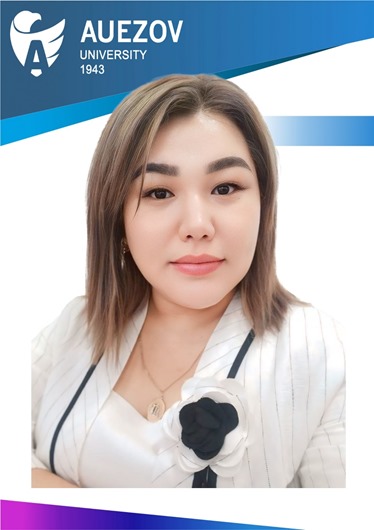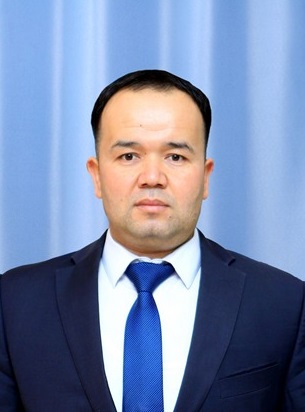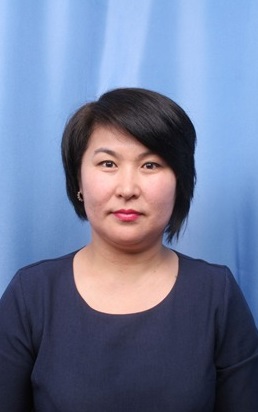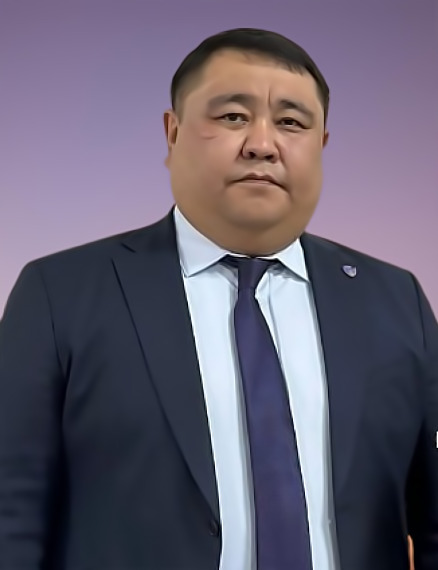Dean of the Faculty
Elikbai Maksat Abdumutalypuly
The candidate of juridical sciences
Address: 160012, Shymkent, Tauke Khan Avenue 5,
Auezov SKU, main building.
Phone: 8-7252-53-60-11
E-mail: This email address is being protected from spambots. You need JavaScript enabled to view it.
Address: 160012, Shymkent, Tauke Khan Avenue 5,
Auezov SKU, main building.
Phone: 8-7252-53-60-11
E-mail: This email address is being protected from spambots. You need JavaScript enabled to view it.
Faculty structure
Structure of the Faculty of Law

Deputy Dean for Academic and Methodological Issues
Mameeva Zarina Temirkhanovna
Master, senior lecturer.
Address: 160012, Shymkent, Tauke Khan Avenue 5,
Auezov SKU, main building.
Phone: 8-7252-53-60-11
E-mail: This email address is being protected from spambots. You need JavaScript enabled to view it.

Dean for Educational and Social Affairs
Bimenov Kairat Tleubergenuly
senior lecturer
Address: 160012, Shymkent, Tauke Khan Avenue 5,
Auezov SKU, main building.
Phone: 8-7252-53-60-11
E-mail: This email address is being protected from spambots. You need JavaScript enabled to view it.

Deputy Dean for Science and Scientific Affairs
Abutayeva Saparkul Bazarbaykyzy
senior lecturer
Address: 160012, Shymkent, Tauke Khan Avenue 5,
Auezov SKU, main building.
Phone: 8-7252-53-60-11
E-mail: This email address is being protected from spambots. You need JavaScript enabled to view it.
Faculty History
Faculty History
The first admission to the specialty "Jurisprudence" was carried out in 1998 at the Faculty of "Pedagogy and Art". The dean of the faculty from 1998 to 2001 was Candidate of Historical Sciences, Associate Professor Saipov A., The training of specialists was also carried out by the Department of Philosophy, which for many years was headed by Doctor of Philosophy, Professor Musaeva N.R. The first graduation of legal specialists took place in 2002.
Thanks to the organizational and personnel measures taken by the university management, the Faculty of Law has been functioning as an independent unit since 2001. The dean of the faculty from 2001 to 2002 was Ph.D., Professor Alibek S.N.
From 2002 to 2005, the dean of the faculty was Ph.D. Bekzatov B.A. A great contribution to the formation and development of the faculty was made by the dean, doctor of pedagogical sciences, professor Bekzatov B.A., deputy dean, candidate of economics, associate professor Efimova I.E., head of the department "Criminal Law and Criminology", Ph.D. Nurtazin E.K.
From 2005 to 2006, the dean of the faculty was candidate of economic sciences, associate professor Zhakipbekov S.Zh. Since 2006, the faculty has been called the Faculty of Law and International Relations.
From 2006 to 2009, the dean of the faculty was Ph.D. in law, associate professor Bitemirov K.T.
From 2009 to 2015, the dean of the faculty was Candidate of Law, Associate Professor Sarykulov K.R.
From the 2015-2016 academic year, PhD in Law, Professor Oryntaev Zh.K. became the dean of the faculty.
Thanks to the organizational and personnel measures taken by the university management, the Faculty of Law has been functioning as an independent unit since 2001. The dean of the faculty from 2001 to 2002 was Ph.D., Professor Alibek S.N.
From 2002 to 2005, the dean of the faculty was Ph.D. Bekzatov B.A. A great contribution to the formation and development of the faculty was made by the dean, doctor of pedagogical sciences, professor Bekzatov B.A., deputy dean, candidate of economics, associate professor Efimova I.E., head of the department "Criminal Law and Criminology", Ph.D. Nurtazin E.K.
From 2005 to 2006, the dean of the faculty was candidate of economic sciences, associate professor Zhakipbekov S.Zh. Since 2006, the faculty has been called the Faculty of Law and International Relations.
From 2006 to 2009, the dean of the faculty was Ph.D. in law, associate professor Bitemirov K.T.
From 2009 to 2015, the dean of the faculty was Candidate of Law, Associate Professor Sarykulov K.R.
From the 2015-2016 academic year, PhD in Law, Professor Oryntaev Zh.K. became the dean of the faculty.
The faculty consists of six departments: the department "Criminal Law and Criminology", head of the department, Ph.D. Akshataeva Zh.B.; department "Criminal process and criminalistics", acting head of the department, Ph.D. Kim E.P., “Civil Law and Civil Procedure”, headed by Ph.D. Elikbay M.A.; Department of "Theory of State and Law", which is headed by Ph.D. Nurtazin E.K.; Department of "International Relations and Customs", headed by Ph.D. Mamasharipova G.A.; department "Philosophy and cultural studies"; head of the department, Ph.D. Zhumabekov M.U.
The Faculty provides training under the undergraduate program for the following specialists: "5B030100-Jurisprudence", "5B020200-International Relations", "5B030400-Customs", "5B011500-Fundamentals of Law and Economics".
The faculty trains undergraduates in the profile and scientific and pedagogical direction in the specialties "6M030100-Jurisprudence"; "6M020100-Philosophy"; "6M050200-Political Science" and "6M040200-Culturology"; .
Faculty students have the opportunity to study in parallel at the military department. Students of the faculty who excelled in their studies actively participate in the academic mobility program.
At the faculty, on a par with the citizens of the Republic of Kazakhstan, foreign citizens from Uzbekistan, Turkmenistan, Armenia, Russia also study.
The faculty builds its activities on new priorities and principles of organization of the educational process, embodied proven methodological approaches in everyday activities. Educational and methodological divisions have been strengthened at the faculty, a credit system of education and a quality management system have been introduced and are successfully functioning. The faculty has a good material base, including the subject room "Courtroom" and a forensic laboratory.
The Faculty provides training under the undergraduate program for the following specialists: "5B030100-Jurisprudence", "5B020200-International Relations", "5B030400-Customs", "5B011500-Fundamentals of Law and Economics".
The faculty trains undergraduates in the profile and scientific and pedagogical direction in the specialties "6M030100-Jurisprudence"; "6M020100-Philosophy"; "6M050200-Political Science" and "6M040200-Culturology"; .
Faculty students have the opportunity to study in parallel at the military department. Students of the faculty who excelled in their studies actively participate in the academic mobility program.
At the faculty, on a par with the citizens of the Republic of Kazakhstan, foreign citizens from Uzbekistan, Turkmenistan, Armenia, Russia also study.
The faculty builds its activities on new priorities and principles of organization of the educational process, embodied proven methodological approaches in everyday activities. Educational and methodological divisions have been strengthened at the faculty, a credit system of education and a quality management system have been introduced and are successfully functioning. The faculty has a good material base, including the subject room "Courtroom" and a forensic laboratory.
In order to improve professional training, the Department of International Relations and Customs actively participates in international integration activities in the field of education and science and maintains creative relations with a number of leading universities in the near and far abroad.
Graduates of the faculty are in demand in the labor market and work in their specialty in the system of the Ministry of Internal Affairs of the Republic of Kazakhstan, the Ministry of Justice, the General Prosecutor's Office of the Republic of Kazakhstan in other law enforcement agencies, education departments, embassies, consulates, customs authorities, in special higher and secondary educational institutions.
The main places of employment for graduates in the specialty "International Relations" as a rule are the Ministry of Foreign Affairs of the Republic of Kazakhstan, the Departments of Internal Policy, the Department of Foreign Relations and Protocol, public and private joint ventures. Some graduates go abroad and continue their studies at universities in China, Western Europe, under the Bolashak program in America, Canada and the UK.
In a relatively short period, the faculty has gone through the stages of origin, formation and development and today appears as an independent structural unit of the university, in which professional teaching staff has been assembled, a solid educational and scientific base has been created, international cooperation has been established with universities in near and far abroad, educational and scientific -production complexes, the educational work of students is well established, conditions for the creative growth of the teaching staff are created.
Master students of the specialty "Jurisprudence" are trained at the Russian University of Peoples' Friendship (Moscow, Russia) with a specialization in "International Law" within the framework of the Consortium of the CIS Network University, which implements joint educational programs.
During its history, the faculty in 2007 and 2017 successfully passed three state certifications for compliance with licensing requirements.
Currently, the faculty faces new challenges to improve the quality of educational services.
Graduates of the faculty are in demand in the labor market and work in their specialty in the system of the Ministry of Internal Affairs of the Republic of Kazakhstan, the Ministry of Justice, the General Prosecutor's Office of the Republic of Kazakhstan in other law enforcement agencies, education departments, embassies, consulates, customs authorities, in special higher and secondary educational institutions.
The main places of employment for graduates in the specialty "International Relations" as a rule are the Ministry of Foreign Affairs of the Republic of Kazakhstan, the Departments of Internal Policy, the Department of Foreign Relations and Protocol, public and private joint ventures. Some graduates go abroad and continue their studies at universities in China, Western Europe, under the Bolashak program in America, Canada and the UK.
In a relatively short period, the faculty has gone through the stages of origin, formation and development and today appears as an independent structural unit of the university, in which professional teaching staff has been assembled, a solid educational and scientific base has been created, international cooperation has been established with universities in near and far abroad, educational and scientific -production complexes, the educational work of students is well established, conditions for the creative growth of the teaching staff are created.
Master students of the specialty "Jurisprudence" are trained at the Russian University of Peoples' Friendship (Moscow, Russia) with a specialization in "International Law" within the framework of the Consortium of the CIS Network University, which implements joint educational programs.
During its history, the faculty in 2007 and 2017 successfully passed three state certifications for compliance with licensing requirements.
Currently, the faculty faces new challenges to improve the quality of educational services.
Research and educational work
At the moment, the faculty has made a transition to a globally accepted multi-level education system, which includes a four-year bachelor's degree with the possibility of continuing education in master's programs. The main content of the bachelor's educational program 5B0301 - "Jurisprudence" consists in: in-depth study of legal disciplines, mastering the basic legal concepts, patterns of state-legal phenomena, the history of legal doctrines, the foundations of civil service and public administration, the basic concepts and categories of civil and criminal, civil- procedural and criminal procedural law, the acquisition of skills and abilities of law enforcement activities in various areas of jurisprudence.
The educational objectives of the undergraduate program 5В0202-"International Relations" are aimed at:
the formation of students' systemic knowledge of the history and theory of international relations, based on basic ideas about the mechanisms of development of the world order, as well as on the experience of international institutional structures;
developing students' ability to think and act in a situational mode (taking into account the peculiarities of the national mentality, the typology of organizational structures, legal traditions and the specifics of social mobility);
students acquire the skills of political and global forecasting, business etiquette, record keeping, building and analyzing various communicative behaviors.
The educational process is focused on individual work with the student, which is the conceptual basis for the design of the educational environment in which the student will have to actively learn. An individual approach is largely ensured by a flexible system of subject and regional specializations, a large number of elective courses.
The educational objectives of the undergraduate program 5В0202-"International Relations" are aimed at:
the formation of students' systemic knowledge of the history and theory of international relations, based on basic ideas about the mechanisms of development of the world order, as well as on the experience of international institutional structures;
developing students' ability to think and act in a situational mode (taking into account the peculiarities of the national mentality, the typology of organizational structures, legal traditions and the specifics of social mobility);
students acquire the skills of political and global forecasting, business etiquette, record keeping, building and analyzing various communicative behaviors.
The educational process is focused on individual work with the student, which is the conceptual basis for the design of the educational environment in which the student will have to actively learn. An individual approach is largely ensured by a flexible system of subject and regional specializations, a large number of elective courses.
Student practice
On the basis of a pre-concluded agreement, students of the faculty have practical training in the following state organizations:
1. Prosecutor's office of South Kazakhstan region
2. Enbekshi city police of the South Kazakhstan region of the Department of Internal Affairs
3. Abay city police of South Kazakhstan Department of Internal Affairs
4. Al-Farabi city police of South Kazakhstan Department of Internal Affairs
5. Enbekshinsky district court of South Kazakhstan region
6. Al-Farabi district court of South Kazakhstan region
7. Abai district court of South Kazakhstan region
8. Department of Justice of South Kazakhstan region
9. Specialized Administrative Court of South Kazakhstan
10. Customs Department of South Kazakhstan region
11. Ministry of Foreign Affairs of the Republic of Kazakhstan
12. Department of internal policy of South Kazakhstan region
13. Apparatus of akim of South Kazakhstan region
1. Prosecutor's office of South Kazakhstan region
2. Enbekshi city police of the South Kazakhstan region of the Department of Internal Affairs
3. Abay city police of South Kazakhstan Department of Internal Affairs
4. Al-Farabi city police of South Kazakhstan Department of Internal Affairs
5. Enbekshinsky district court of South Kazakhstan region
6. Al-Farabi district court of South Kazakhstan region
7. Abai district court of South Kazakhstan region
8. Department of Justice of South Kazakhstan region
9. Specialized Administrative Court of South Kazakhstan
10. Customs Department of South Kazakhstan region
11. Ministry of Foreign Affairs of the Republic of Kazakhstan
12. Department of internal policy of South Kazakhstan region
13. Apparatus of akim of South Kazakhstan region
Graduates of the faculty have the opportunity to continue their education in the magistracy.
Master's degree in the specialty 6M030100 - Jurisprudence SKSU named after M. Auezov was opened in 2008, today the university has trained about 105 masters in the specialty 6M030100 - Jurisprudence.
Educational master's programs of SKSU named after M. Auezov are implemented in two areas of training - scientific and pedagogical and profile - and provide in-depth specialized professional training, allowing graduates to subsequently successfully engage in scientific, pedagogical, managerial and expert activities.
Studying in the magistracy of SKSU named after M. Auezov involves active research work, participation in scientific projects of the university under the guidance of leading experts in priority areas of science and practice.
The implementation of master's educational programs is carried out by the university in close cooperation with leading foreign organizations of education and science. For undergraduates of SKSU, invited foreign professors give lectures every year, thanks to the international relations of the university, undergraduates of SKSU have the opportunity to travel for training and internships in foreign universities and research centers.
Master's degree in the specialty 6M030100 - Jurisprudence SKSU named after M. Auezov was opened in 2008, today the university has trained about 105 masters in the specialty 6M030100 - Jurisprudence.
Educational master's programs of SKSU named after M. Auezov are implemented in two areas of training - scientific and pedagogical and profile - and provide in-depth specialized professional training, allowing graduates to subsequently successfully engage in scientific, pedagogical, managerial and expert activities.
Studying in the magistracy of SKSU named after M. Auezov involves active research work, participation in scientific projects of the university under the guidance of leading experts in priority areas of science and practice.
The implementation of master's educational programs is carried out by the university in close cooperation with leading foreign organizations of education and science. For undergraduates of SKSU, invited foreign professors give lectures every year, thanks to the international relations of the university, undergraduates of SKSU have the opportunity to travel for training and internships in foreign universities and research centers.
Faculty news
